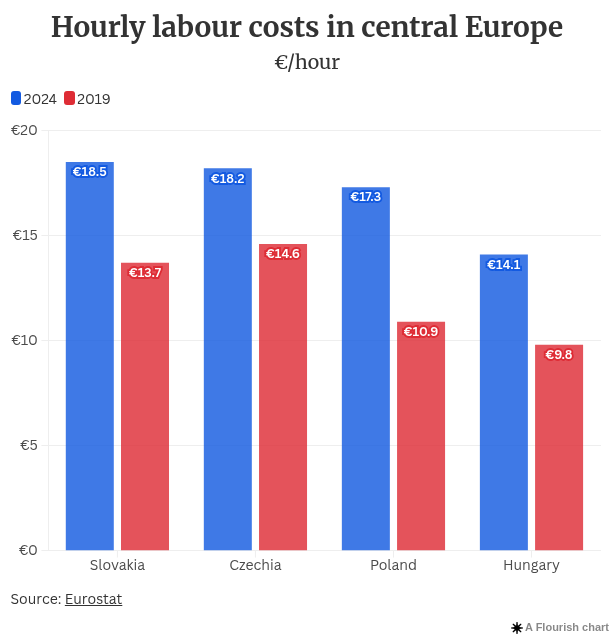Workers in Slovakia are earning more than ever before — and that’s not just good news for households. It is a sign that the era of cheap labour in Slovakia may finally be over.
According to the latest Eurostat figures, Slovakia’s average hourly labour costs overtook those in the Czech Republic for the first time in 2024, hitting €18.50. That makes Slovakia the most expensive country for labour in central and eastern Europe, writes Denník N.
While this reflects rising wages, it is also a result of government policy. Labour costs include not only salaries but employer contributions, training, and a growing list of non-financial benefits. Recent tax hikes and mandatory bonuses for night and weekend work are pushing costs ever higher.
“For employees, it’s good news,” said Michal Lehuta, an analyst at VÚB Bank. “But for competitiveness and attracting investors, it’s more complicated.”
Slovakia now has the third-highest share of non-wage costs in the EU — behind only France and Sweden. Analysts say it is largely due to policies introduced under Robert Fico’s government, including a higher corporate tax rate, a new financial transaction tax and increased health insurance levies.
While wages rose faster in the Czech Republic last year, Slovakia’s labour costs climbed more steeply — a signal, experts say, that the rise is tax-driven rather than wage-led. For example, with a gross monthly salary of €1,500, an employee in Slovakia takes home just €1,143, while the total cost for the employer reaches €2,043 — nearly double the net pay.
That might explain why companies are turning to self-employed contractors, who come with fewer obligations and lower overheads.
EU hourly labour costs in 2024
In 2024, average hourly labour costs across the European Union rose to €33.50, while the figure for the euro area reached €37.30 — up from €31.90 and €35.70, respectively, the previous year.
But beneath the averages lie stark differences. The lowest labour costs were recorded in Bulgaria (€10.60), Romania (€12.50) and Hungary (€14.10), while the highest were in Luxembourg (€55.20), Denmark (€50.10) and Belgium (€48.20).
Source: Eurostat


